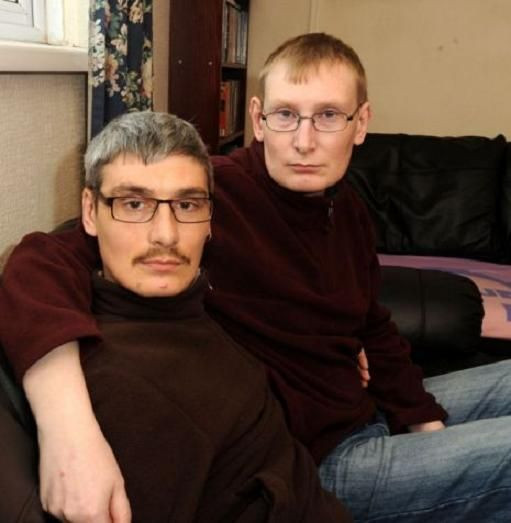Bizarre Age-Reversal "Benjamin Button" Disease Makes 2 Middle-aged Brothers Act like Kids

Two middle-aged brothers living in the UK appear to have developed a bizarre “Benjamin Button” age-reversing disease that makes behave like young children.
In 2011, Matthew, 39, and Michael Clark, 42, were both diagnosed with terminal leukodystrophy, neurological condition, which generally only affects newborns, that disrupts the growth or maintenance of the myelin sheath leading to problems in the brain, nervous system and spinal cord, according to the Daily Mail.
Before they were diagnosed, both the brothers had normal jobs and normal relationships until their mannerisms became increasingly childlike to the point where they had to move back in with their parents and required round the clock care.
Doctors estimate that Michael, 42, who served as a regiment in the Royal Air Force, now has the mental age of a 10-year old and is reported to watch cartoons and giggle constantly.
Matthew, 39, who worked in a Walkers potato chip factory and has a 19-year-old daughter who is expecting a baby, behaves like a toddler.
Doctors say that the neurological disease which echoes the plot of the film The Curious Case of Benjamin Button, based on the F. Scott Fitzgerald novel, in which an old man, played by Brad Pitt, gradually grows younger rather than older, is extremely rare and only about 100 people are affected in UK.
The brothers’ parents Anthony, 63, and Christine Clark, 61, told the Daily mail that they had to set aside their dream retirement to look after their sons.
Anthony said that the average day for the family currently consisted of the boys playing with board games, cartoons and comics.
“Both the boys like cartoons, especially the Smurfs and Alice in Wonderland, and the types of films they like to watch has changed to those aimed at children,” Anthony said, according to the British newspaper. “Matthew loved the first Back to the Future, but he didn't like the second and third one and like a kid if he doesn't like it he just gets up and leaves or turns it off.”
“At the moment they really like snakes and ladders and Monopoly but other games like Cluedo we've bought them are proving too difficult,” he added. “In terms of diet they both love crisps but we have tried to improve their eating habits.”
The brother’s parents began noticing strange things about their sons in 2007. Anthony said that while he usually called Matthew and Michael once a week and sent then a text message on most days, they had initially stopped replying to texts or returning phone calls.
When Matthew lost his job at the factory, after his wife left him, he had been so confused that he sat in a room with just a candle at night and no food or electricity for two weeks because he didn't know how to claim benefits, according to the Daily Telegraph.
Michael, who had not worked since being medically discharged from the RAF after falling and injuring his knee, went on to become a cabinet maker, but today he has lost all his skills, had been evicted from his apartment because he stopped taking care of himself and doing household chores.
After sleeping in the park for three weeks, he found a soup kitchen that sent him to the Salvation Army who sent him to a doctor after they realized something was wrong.
Doctors had eventually conducted a MRI scan and diagnosed Michael with the disease.
"When they asked him if he had any siblings he said he had a brother and they ran tests on Matthew and discovered he had the same thing,” the brothers’ father told The Telegraph. "At first we were told doctors thought no one else had this condition and then we found out there are 100 adults in the UK, but no one had heard of it occurring in two siblings.
“Both of them are very childlike now. Matthew went out the other day and bought himself a train set and a Mr Potato Head,” Anthony told the Daily Mail. “He also has these awful episodes where he screams and shouts and says 'I don't know what I'm doing'.”
“It is like an adult having a toddler's tantrum. It's obviously worse for him but it is terrible for us too,” he added. “There's nothing we can do to help and we feel absolutely powerless.”
Experts estimated that there was only a one in three billion chance of two people who carry the gene deficiency meeting and becoming partners, and the chances of the children developing the condition depend on the type of leukodystrophy the parents have. If both parents carry the recessive gene, then the children have a one in four chance of developing the disease.
“If only the mother has the gene every boy born would have a form of leukodystrophy. Of course it's important to say there are 37 known types of the disease at the moment but doctors are diagnosing new forms which simply have not been catalogued yet and named,” CEO of Myelin Project’s British arm, Lynda Carthy said, according to the Daily Mail.
Published by Medicaldaily.com



























